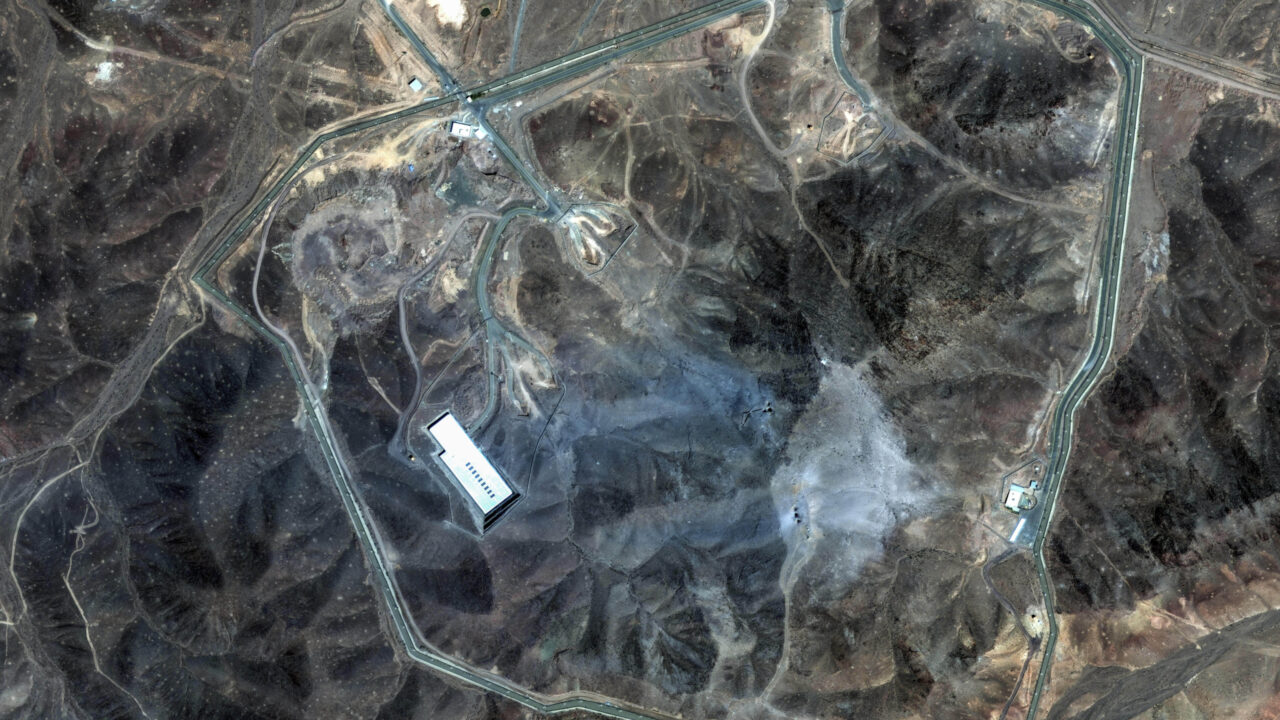ECFR Council members urge European governments to pull every available lever to prevent escalation in the Middle East
- Statement
- View from the Council
- 3 minute read

This satellite image provided by Maxar Technologies shows damage at the Fordo enrichment facility in Iran after U.S. strikes, Sunday, June 22, 2025
Image by picture alliance / ASSOCIATED PRESS | Uncredited
©
The United States has now entered the war between Israel and Iran by conducting unprecedented military attacks against Iranian nuclear facilities. These pre-emptive strikes, carried out without the imminent risk of an Iranian attack, are in violation of international law. As members of the ECFR Council, we urge European governments to press the US administration and Iran to adopt a swift exit-strategy before this conflict sparks a wider regional war. Otherwise, as with the 2003 invasion of Iraq, European countries risk being sucked into this military fight, at a heavy cost to our continent’s own interests.
We reiterate that Iran should never be allowed to have a nuclear bomb. But we also firmly believe that there is no sustainable military solution to the threats posed by the country’s large-scale nuclear program, which is far too advanced in knowledge and capabilities to be irrevocably destroyed. Despite the recent waves of attacks, Iran and the US have not entirely shut the door to diplomacy. Europeans need to help prise it back open. They should focus on containing the spillover from this US attack, and spearheading diplomatic action that can permanently contain Iran’s nuclear programme.
We call on European heads of government to:
- Press for swift military containment of the situation before this conflict sparks a wider regional war, one that could draw in European involvement. This should include using all available channels to urge Tehran that a disproportionate counter-escalation with the US could trigger yet-larger military strikes across the country that could result in state collapse. European governments should also press Iran to keep international inspectors on the ground and provide them with access to its continued nuclear activities—vital for creating confidence in any future deal. In parallel, European actors should strongly oppose wider Israeli and US strikes against Iran and call for an immediate ceasefire to allow for diplomacy.
- Clearly outline that European countries will not be involved in any offensive military campaign against Iran unless they are directly attacked. Given the risk of regional conflict, European governments should enhance protection for diplomatic and military personnel, and other assets in the Middle East that risk being caught in the crossfire of intensified military strikes.
- Mobilise diplomatic channels with all sides to push for a sustainable political strategy on Iran’s nuclear programme. While Trump may now want a negotiated outcome, it is highly unlikely that the country can resume direct diplomacy with Washington at this stage. Europeans should work closely with the Arab Gulf states and Turkey to fill this vacuum, intensifying high-level engagement with Iran and the US. They should arrange a quick follow-up meeting with the Iranian government, at foreign-minister level, to sustain the diplomatic momentum created over the past week between the E3 (Britain, France, Germany), the EU High Representative and Iran.
- Europeans need to propose a diplomatic strategy that is realistic in its demands on Iran and face-saving in its framing. Even though Tehran is now on the ropes, diplomatic efforts will hit a wall if it those insist it capitulate to American demands to entirely dismantle its nuclear program and give up all uranium enrichment on Iranian soil. Maximalist demands on Iran–including negotiating over missiles now viewed by Tehran as its main deterrence umbrella—will likely push the country to use every means still available to reach nuclear breakout.
- A more viable endgame would involve a return of widescale inspections by international monitors and an immediate, substantial roll-back of Iranian uranium enrichment. The goal should be Iran pursuing this enrichment through a regional consortium backed by the United States. Such a political track could also incentivise a more constructive Iranian position on wider regional issues—including Tehran’s support to armed groups—where by contrast military action would force Iran to play all its escalatory cards in the Middle East to excert counter-pressure.
- Provide protection for ordinary Iranians looking to leave the country through neighbouring Turkey, Iraq, Armenia and Azerbaijan where European governments have significant diplomatic and consular networks. Just as European governments have offered to bring home European nationals in Israel, they should extend the same offer to European citizens currently trapped inside Iran. They should also condemn any spikes in executions by Iran in this moment of particular internal strain —in which political prisoners and activists will face increasing pressures.
Signatories
- Carl Bildt, former Swedish prime minister and foreign minister, and chair of the ECFR board
- Alistair Burt, former UK minister of state for the Middle East at the Foreign and Commonwealth Office and former MP
- Arancha Gonzalez Laya, Dean of Paris School of International Affairs; former Spanish Minister of Foreign Affairs
- Andrzej Olechowski, former Polish minister of foreign affairs
- Nathalie Tocci, Director, Istituto Affari Internazionali; former Special Advisor to EU High Representatives
- Pierre Vimont, former Secretary General, European External Action Service; former Ambassador of France to the United States
The European Council on Foreign Relations does not take collective positions. ECFR publications only represent the views of their individual authors.
